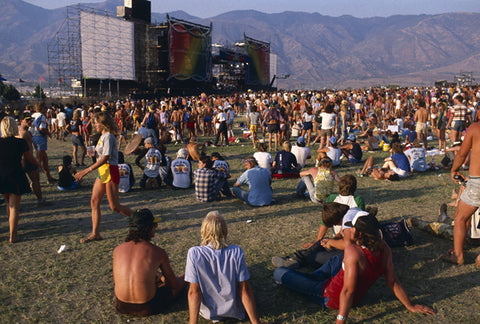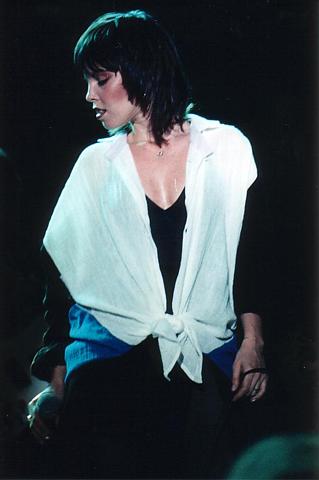This was huge. In 1982, Apple co-founder Steve Wozniak hatched an ambitious and very expensive musical plan and committed a sizeable chunk of his sizeable fortune to a musical event, billed as the biggest thing since Woodstock, Wozniak staged a three-day concert in the mountains of San Bernardino County, in Southern California, that featured some of the day's biggest names in music. The "Us Festival" kicked off under scorching conditions on September 3, 1982.

Wozniak, then 32 and on leave from the budding computer giant after a plane crash left him shaken and unable to form memories for half a year (useful if you don't want to remember how much money you lost putting in a festival!), spent 18 months and $13 million (!!) preparing what he dubbed "the Super Bowl of rock." He intended it as a unifying antidote to the just-ended Me Decade - Us not Me - a benevolent we-are-the-world uprising evident in the event's name and furthered via satellite links to the Soviet Union during each fest. Yeah, OK. Pass the bong.
Sparing absolutely no expense, Wozniak aimed to bring together many of the top artists of the day, segregated by genre new wave, heavy metal, traditional rock, and enhanced by cutting-edge innovation, including one of the first uses of jumbo video screens at a concert. It also served as Ticketmaster's entry into the Southern California market.
 Bill Graham - a legend in his own lifetime
Bill Graham - a legend in his own lifetimePieced together by Bay Area legend Bill Graham, the talent amassed played out like several stadium concerts crammed together. It was like the Foreigner-led Summer Strut, held two months earlier at the Big A, or one of Ontario's two California Jams (in '74 and '78) expanded to a long weekend.
It pulled 425,000 people in total across the three days, despite sluggish pre-fest ticket sales. Prices: $17 per day, $35 for the weekend.
On the opening day of US '82 alone, capped by the Police before more than 100,000 fans ("one of our biggest shows ever," manager Miles Copeland contends), presented a staggeringly strong lineup from start to finish. In order of appearance: Gang of Four, the Ramones, the English Beat, Oingo Boingo, the B-52's, Talking Heads and the headliner, mid-tour behind their fourth album, Ghost in the Machine, and in ripping form.

The crowd doubled in size for Day 2, with thousands parking as far as a dozen miles away to bake and dehydrate in near-record 112-degree heat, accompanied by reversed Santa Ana winds and water shortages. Heavy weather. Beer went for $1.50, cheeseburgers for $2.75, ham and eggs $4.50.

Tom Petty and the Heartbreakers closed that portion, after sets from Santana, Pat Benatar, the Kinks, a surprisingly powerful hour from the Cars, plus Eddie Money and Dave Edmunds.

Attendees awoke on Day 3 for breakfast with the Grateful Dead (who encored with the Stones' "Satisfaction") before Jimmy Buffett, Jackson Browne and Fleetwood Mac wrapped it up. One can only imagine how much cocaine was hoovered up across the weekend.

There was one related death, when a 23-year-old Santa Rosa man burned in a four-car pileup on I-15 in the wee hours before the fest began. One rape was reported and 67 people out of 2,050 who were medically treated on site had to be transported to nearby hospitals. Authorities considered that a rousing success. So did Wozniak.
"They said we couldn't do it," he told a press gathering at the conclusion of the first fest. "They said it was too expensive, too unwieldy. We proved them wrong. The timing was so right for this type of festival. There is a spirit, a push for unity starting to spread. We tried to capture it. I think we did it. Nice thought, Steve, but ultimately proved untrue.
"We may just have to do this again," he concluded, despite having ultimately lost $5 million on the venture. And they did so, the following year, spending even more money and making an even bigger loss.
In a way, this had the same aims of many of the counterculture events 15 years earlier, but instead of trying to deliver them through music and flowers, they threw money at it instead. It was hard to see this in the altruistic way that Steve Wosniak did at the time really. Though his ability to lose epic amounts of cash was certainly part of the old school festival promoter tradition.



